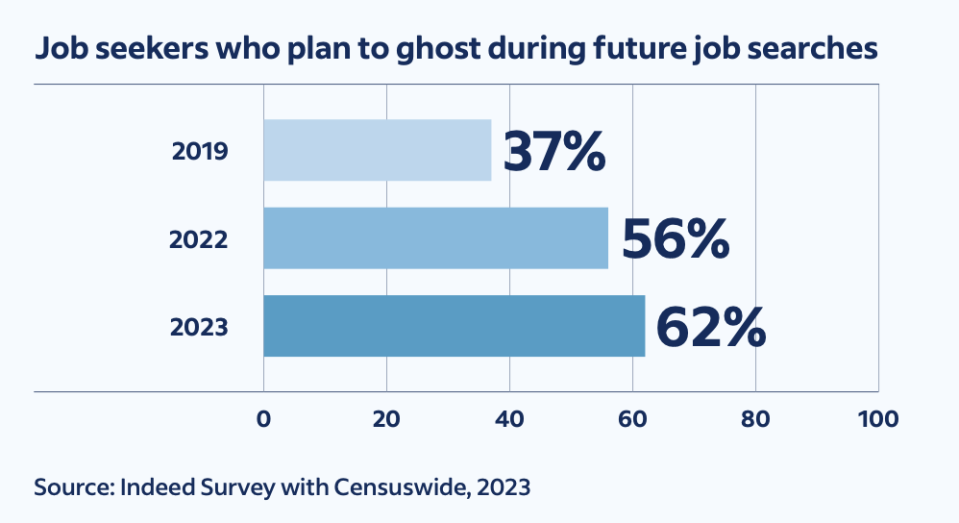
Old views of traditional retirement are gone. New retirement will look different.
Source link
job
February job report, Powell’s visit to Capitol Hill are on investors’ radar this week

It is a crucial week for economists and investors as key economic data will be released, along with two days of testimony from Fed Chairman Jerome Powell before Congress.
Powell testifies before Congress
Wednesday, Thursday at 10:00 a.m. Eastern
Fed officials have been singing from the same songbook over the past few weeks, stressing patience about potential interest-rate cuts. Fed Gov. Christopher Waller, summed it up best when he recently asked “what’s the rush?”
Powell may not have appreciated that question. He is going to spend two days this week with lawmakers on Capitol Hill, many of whom are more than likely to have an answer prepared for Waller’s question.
Remember, Senate Democrats already wanted the first rate cut in January, saying that the Fed’s tight monetary policy was damaging the housing market. Talk of patience might not be welcomed.
Democrats are eager for the Fed to cut rates and potentially give the economy a jolt going into the November elections. Republicans will likely stress the need for the Fed to stay the course to combat still-high inflation. It is a political year and the Fed’s actions will be seen in that light, no matter how often it swears to be apolitical.
February job report
Friday at 8:30 a.m. Eastern
Economists expect the labor market to cool after two “fiery” job gains the past two months, said Douglas Porter, chief economist at BMO Capital Markets. In December and January, the economy added an average of 268,000 net new jobs per month.
Economists surveyed by the Wall Street Journal expect the economy to add 210,000 jobs in February. The unemployment rate is expected to remain steady at 3.7%., nearly as low as it has been in 50 years. Average hourly wages are expected to moderate to a 0.2% gain from the strong 0.6% rise in the prior month.
“Even though we believe job growth will cool in February, we still see a number of signs that the labor market remains strong, Feroli of JPMorgan said.
Q1 GDP tracking estimate
Data not officially released until end of April
Economists are ratcheting up their forecasts for first-quarter gross domestic product based on recent data.
Michael Feroli, chief U.S. economist at JP Morgan Chase, said he raised his estimate to a 2.25% rate in the January-March quarter, from his prior forecast of 1.7%.
Aichi Amemiya, senior economist for the U.S. at Nomura Securities, said he’s raised his tracking estimate to 2.2% from 2.1%.
The Atlanta Fed’s GDPNow estimate is 2.1%, down from 3% previously.
The government revised its estimate for fourth quarter growth to 3.2% from 3.3% previously. The official first-quarter GDP data won’t be released until April 25.
So the economy “is still in the soft landing zone,” said Scott Anderson, chief U.S. economist at BMO.
My friend’s husband pressured her to give up her job — and ‘lost’ her passport
I want to help a friend who is going through some challenges with her husband. My friend and her husband are both from India and work in the Pacific Northwest. They have twin daughters who are 2 years old. My friend’s husband appears to be a friendly and agreeable person, and has an exceedingly large circle of friends.
My friend, however, complains that he has a temper and is extremely controlling. My friends and I have witnessed the controlling behavior, where she has to manage the kids completely on her own and her husband doesn’t seem to bother at all about helping. Also, he controls what she does and who she visits.
She has complained that her husband has forced her out of the house on several occasions. Several friends and I visit the couple on social occasions, and we veer between ignoring him completely and imploring him to be more helpful around the house. He simply ignores our advice. We have not witnessed our friend being thrown out of the house, but I trust her word.
A ‘lost’ passport
My friend’s husband stopped her from continuing her job, and now she is now forced to be a homemaker, something she doesn’t like. It may sound unbelievable and is obviously unjust, but it’s fairly common in some cultures for women to be treated like this. We friends have often discussed the issue and debated how we can help her.
These discussions often end with “We should not interfere in their life” or “It’s her fight and she should push back and know what to do.” Though at some level, we may be unsure or unwilling to ruin our friendship with her husband. My friend recently told friends that her husband “lost” her passport and is not lodging a police complaint or getting a new one.
She told me today that she is so fed up that she just wants to go to her parents in India, but she doesn’t have her passport. I sometimes suspect that her husband is just hiding her passport. I have often thought that maybe I should just call the authorities and tell them the issue and let them help her.
However, I am also not sure if this is the right step. What should we do?
Confused Friend
Related: My ex-husband has a life-insurance policy on me — and jokes he’ll be ‘Suspect No. 1’ if I die. Other than haunting him, what can I do?

“Coercive control and financial abuse are often tied together.”
MarketWatch illustration
Dear Friend,
Nobody knows what goes on inside a relationship except for the people involved.
However, there are signs of coercive control and financial and domestic abuse that should not be ignored, whether you are a friend or family member or a hairdresser, manicurist or neighbor. We should all remain vigilant. You can’t live somebody’s life for them, but you can give them information to help them become aware of what is happening.
Coercive control and financial abuse are often tied together. The vast majority of domestic-abuse cases also involve economic abuse, and finances are one of the main reasons a person stays with or returns to an abusive partner, as noted in a research brief by the University of Wisconsin-Madison Center for Financial Security. The fact that your friend’s husband pushed her to give up her job is a bad sign.
Unfortunately, all the signs are there. Your friend’s husband removed her source of income and ability to travel, and she is completely reliant on him for money. Financial control and a gradual dismantling of her self-confidence go hand in hand. Other signs include economic exploitation where the abusive partner forces their partner to take out a line of debt, or does so in their name.
How to escape financial exploitation
I’m extremely reluctant to conflate your friend’s husband’s cultural background and his behavior. Men who engage in coercive control over their wives cross all geographical boundaries, and domestic abuse is something of an epidemic in the U.S.
“Intimate partner violence is a persistent public health problem that affects millions of Americans every year and disproportionately affects women and some racial/ethnic minority groups,” according to the Centers for Disease Control and Prevention.
Your friend’s marriage and life may now be her new normal, so if you believe she is in danger of being controlled and manipulated, tell her the signs and say you are concerned about her long-term well-being. A year can turn into 10 years in the blink of an eye, and if she can’t do it for herself, she may be willing to do it for her twin daughters.
Domestic-abuse survivors must be financially prepared to leave, as escaping is only half the battle, says the Kansas City, Mo.-based law firm Hale Robinson & Robinson. They must support themselves once they flee the relationship, or their chances of success will fall. “Transportation, shelter, food, and funds for the ensuing legal battle must be obtained,” the firm adds.
There are women’s shelters that have a detailed plan of action on how to leave an abusive relationship, including the documents she should bring with her. These include bank-account numbers, credit-union and 401(k) information, copies of car titles and past three years’ income-tax returns, and the partner’s Social Security and bank details.
Godspeed in your efforts to protect your friend — and good luck to her.
Read next: I lost $240,000 after a ‘friend’ I met on Instagram encouraged me to invest in crypto. Can I write off my loss?
Are you experiencing domestic violence or coercive control? Call the National Domestic Violence Hotline at 1-800-799-SAFE (7233) or visit thehotline.org. FreeFrom works to establish financial security for domestic-violence survivors, and the National Coalition Against Domestic Violence supports efforts to change conditions that lead to domestic violence and coercive control.
You can email The Moneyist with any financial and ethical questions at qfottrell@marketwatch.com, and follow Quentin Fottrell on X, the platform formerly known as Twitter.
The Moneyist regrets he cannot reply to questions individually.
Previous columns by Quentin Fottrell:
‘I don’t want my wife to lose everything’: I’ve been diagnosed with dementia — I suddenly could not spell or write legibly
‘Things have not been easy’: My sister is a hoarder and procrastinator. She is delaying probate of our parents’ estate. What can I do?
‘I gave up a job that I loved passionately’: My husband secretly set up a trust that includes our home and his investments. What should I do?
Check out the Moneyist private Facebook group, where we look for answers to life’s thorniest money issues. Post your questions, or weigh in on the latest Moneyist columns.
By emailing your questions to the Moneyist or posting your dilemmas on the Moneyist Facebook group, you agree to have them published anonymously on MarketWatch.
By submitting your story to Dow Jones & Co., the publisher of MarketWatch, you understand and agree that we may use your story, or versions of it, in all media and platforms, including via third parties.
Should I give up my job to spend time with my son — and dip into my trust fund?
My long-term boyfriend and I, both 45, finally had our first child last year after years of trying.
Due to our age and some other factors, he is likely to be our only child. He is the light of my life, and I’m realizing that as I only get one chance to experience these magical early years with him, I hate that I’m doing it while also working full-time, robbing me of the precious little time I have with him as a toddler.
I am the primary earner in our household, making about $150,000 a year in an intense job. My boyfriend has been out of work for over a year after a failed attempt at switching industries, and probably won’t have a new job for a little while longer as he recalibrates what’s next.
Though I’m very successful in my career, the birth of my son has cemented for me that I hate the 9-to-5 grind, and it’s not what I want to do for the next 20 years. I would love to work for myself, with a flexible schedule that allows me to spend more time with my son each day.
Passive-income streams
Since he’s been born, I’ve been researching ways to both do that as well as building some other passive-income streams. In an ideal world, I’d love to start those up and get them moving so that I can leave my job in the next 7 to 8 months.
My main concern is that I’m terrified that, no matter what I cobble together, I won’t match my current income with the new plan. While I’m hopeful my boyfriend will also get a new job in that time period, I’m thinking conservatively and only accounting for one income (mine) in this plan.
Before we had our son we were in a great financial spot — all housing costs were coming in at under 30% of my pay and I was maxing out my 401(k). However, with childcare costs and his lack of income we’re now basically living paycheck to paycheck. If I am able to take on this new self-employed dream some costs (childcare) would go down, but others would increase.
Six-figure trust fund
There’s one catch, though. I have a trust fund that is worth a very high six figures. I rarely ever touch it: I mainly look at it as an enormous emergency savings fund should the bottom fall out of the economy like it did in 2008.
But the other day, as I struggled to crank out numbers for this new life plan, it hit me that I could just take from the trust to supplement any shortfall. In four to five years when my son is in school, if my self employment isn’t working out I could always reenter the traditional labor force.
But this plan scares me, simply because I’ve always viewed my trust fund as my safety net, and I’d be depleting it. Is this a good idea? A bonkers idea? What else should I be thinking about?
For context, it’s not my only source of investments: I currently have about $395,000 in my 401(k) and Roth IRA, a $10,000 “slush fund” investment account, and about $80,000 in company stock, with more stock due to vest over the course of my (potential) remaining time at the company.
I have an emergency cash fund in a high-yield savings account, but I’ve had to pull from it lately so it doesn’t even cover three months of expenses right now. So should I go for it? Money I can always earn, but this time with my son I will never get back.
Time is Fleeting

“Wait until your boyfriend finds a job before making any move.”
MarketWatch illustration
Dear Time is Fleeting,
First, a warning: There’s no magic bullet.
Of course, we should all — in an ideal world — feel fulfilled by our jobs and partners and life, but our wantonness will keep us looking for more ways to find that magic elixir. Happiness is an inside job. When you change one thing in your life, you may realize that there is something else that you need to fix, and then something else, like a house that always needs repairs, and never quite suits your needs. One of my favorite pieces of advice: “Listen to your body because your mind lies through its teeth.” Don’t act from a place of fear, anger or ego. Listen to how you feel.
If your trust fund can buy anything, however, it’s peace of mind for the future. I agree that it should be used to help you maintain a semblance of contentment for the here-and-now. There’s no point having a six-figure trust fund with high six figures if — like a treasured china tea set — you are not going to tap it at the most critical and important times of your life. If you want to spend the next couple of years with your son, instead of paying for childcare, you could do it. One major caveat: Wait until your boyfriend finds a job before making any move.
Millions of parents are in your boat. Weekly daycare costs for children in the U.S. are now running at $284 per week, up 54% over the previous decade, according to Care.com. If you can save that money, and withdraw from your trust fund over, say, the next two years, it is essentially fulfilling part of its purpose. You don’t say what profession you are in, but women who take time out of their careers to raise their children obviously lose promotional opportunities and, when they return to the workforce, their pay tends to fall behind that of their peers.
MarketWatch recently built a tool that uses Department of Labor data to show the average cost of childcare by county and how that compares to your income. As MarketWatch reported when the tool was launched: The average cost of center-based group care infant childcare in Queens County, N.Y. was $23,635 in 2022. A family would need to make at least $337,647 per year for that to be 7% of their income. The median annual income for families in Queens in 2020 was $81,193, so they would need to spend roughly 26% of their income on childcare.
In the meantime, ask your employer if you can work remotely two days a week and/or see if you can move to a part-time schedule. It may be that you can keep your job and spend more time with your son, too. It may not be an all-or-nothing scenario. If you do decide to give up your job for now, and you are in a career that you could easily return to in the event that your business idea does not work out, and your boyfriend finds work, you will be in a more secure position to take a career break. So many “ifs.” But you’re right. You won’t get this time again.
Talk to a financial adviser and a therapist because it’s almost always a bad idea to make a financial decision based on emotion. Of course, we should have agency over our own lives, but bringing in third-party help will bring a fresh, independent perspective. Sometimes, we often think, ‘If I could just change this one thing, I’d be happy.’ But that’s often our mind and emotions playing tricks on us. What you don’t want to happen is one year down the line, feeling overwhelmed with full-time childcare, and wondering why you gave up a $150,000 job.
Give yourself some time to get used to having this new person in your life, and see how the next six months play out.
More from Quentin Fottrell:
My father has dementia and ‘forgave’ my brother’s $200,000 house loan. The nursing-home notary said he was of sound mind. What can we do?
My husband bought our house with an inheritance. I signed a quitclaim. He said I could live there after he dies, but changed his mind. What now?
Low-paying jobs are the economy’s way of saying you should get a better job’: I’ve decided to stop tipping, except at restaurants. Am I wrong?
You can email The Moneyist with any financial and ethical questions at qfottrell@marketwatch.com, and follow Quentin Fottrell on X, the platform formerly known as Twitter. The Moneyist regrets he cannot reply to questions individually.
Check out the Moneyist private Facebook group, where we look for answers to life’s thorniest money issues. Readers write to me with all sorts of dilemmas. Post your questions, or weigh in on the latest Moneyist columns.
By emailing your questions to the Moneyist or posting your dilemmas on the Moneyist Facebook group, you agree to have them published anonymously on MarketWatch.
By submitting your story to Dow Jones & Co., the publisher of MarketWatch, you understand and agree that we may use your story, or versions of it, in all media and platforms, including via third parties.
Opinion: Working a second job or thinking about it? Consider this investment instead.
“A few key considerations as you evaluate which ‘hustle’ is right for you.”
In the world of financial literacy, a few items and actions have emerged as meme-level villains: daily Starbucks coffee, eating avocado toast, renting an apartment instead of buying a home.
Gurus demonize these behaviors while wagging their fingers and criticizing personal decision-making. Yet while there is more than enough emphasis placed on scrimping and saving, we rarely talk enough about the other half of the equation: maximizing your take-home income.
My mentor once told me, “You can only save as much as you earn, but you can always earn more money.” Some may see getting a second job as their only option, but more and more people read this quote and immediately think of two words: “side hustle.”
The idea of pursuing your passion is something that older generations didn’t necessarily focus on when choosing a career path. Many chose jobs that paid the bills while allowing for some fun outside of work. But a side hustle has become more conventional in recent years — not least due to the rise of social media making it easier for our casual gigs to become full-blown money-making entrepreneurial endeavors.
Whether you are saving for a short-term goal like a wedding or a down payment, or you’re looking for longer-term supplementary income, side hustles can be a valuable path to extra cash. But take it from someone who has navigated the transition from passion project to side hustle to full-time career, there are a few key considerations as you evaluate which “hustle” is right for you.
When I think about a side hustle, I think about something that makes you money relatively quickly. This is different from a passion project, a hobby that acts as a mental recess and sparks your creativity: painting; reading, needlepoint, or even playing video games. The moment you introduce money into a hobby, the stakes change. There are paying customers on the other side, creating deadlines and the need for new ideas, products and services. You can’t just take a break for a month if you owe someone a good or a service.
So while it may still look like the fun activity you once loved, responsibility and obligation can change that. Acknowledging that you don’t have to monetize every passion is step one in ensuring that your side hustle doesn’t burn you out. Some things are sacred and should be kept that way.
“Your side hustle needs to fit into your life.”
The next consideration may seem obvious, but is essential: your side hustle needs to fit into your life. Whatever you choose, it must be complementary to the life you are already living. While it will cause some short term discomfort (this is work, after all), you shouldn’t take on too much stress or rearrange your entire life to make it happen. I like to tell people to look at their full-time job and evaluate what skills they aren’t utilizing. Maybe you’re a data analyst and you want to be more creative, or maybe you’re on your feet all day and you don’t mind sitting at a desk at night. Let that guide you.
“Don’t go into debt for your side hustle. ”
As you narrow your search, consider the costs associated with your side hustle. First of all, it should have a low startup cost. The hope of course is that you love your side hustle and it sticks, but if not, we don’t want you in a worse financial position than when you started. Don’t go into debt for your side hustle (we’re looking at you, MLMs).
Beyond startup costs you’ll want to consider your business expenses, your time, and your energy. Just as corporations have margins, so does your side hustle, and the higher the margin, the better. Think you’re too old to babysit? Perhaps you’ll reconsider when you realize that babysitting doesn’t require anything but your time and minimal transport costs — nearly a 100% profit margin. On the other hand, something like an Etsy shop is going to require raw materials and web hosting and shipping and handling. Those “hidden expenses” could add up and leave you wondering if your side hustle is even worth it.

“The best investment anyone can make.”
Lastly, it’s important to make the distinction between a side hustle and a second job, because the use of both terms has become more all encompassing over time. People often clock in for two or more shifts a day to make ends meet. That is a second job: the hours are less flexible and you’ve signed a piece of paper saying “Yes, I work here and I’ll show up on time.” A second job can strain your first job, as you’ll need to juggle both schedules.
Conversely, side hustles take more time to nurture, and aren’t as consistent in what they pay, especially not at the start. But they typically provide more freedom since you set your work hours.
Ultimately, whatever path you choose to create supplemental income is your choice. If your side hustle becomes lucrative, be sure to reflect on your intentions, goals, and what success looks like to you. When I began to post content across social media and consistently make money from it, I made a concerted effort to test out my newfound side hustle for 15 months before diving in full time. I needed to be sure I liked what I was doing and that it could sustain me year after year.
After juggling a full-time job and my content creation for 15 months, I still liked it enough to keep going, so I finally chose to go all-in. Ultimately, the decision to commit full-time was no different from any commitment. After a long trial period, I thought through the pros and cons and I bet on myself — the best investment anyone can make.
Vivian Tu is the author of RICH AF: The Winning Money Mindset That Will Change Your Life (Portfolio, 2023). Tu, a former Wall Street trader, is founder and CEO of the financial equity platform Your Rich BFF. She also helms the podcast, “Networth and Chill.”
More: Looking for a remote job? Your chances of finding one are dropping, Indeed says
Also read: Remote work offers less scope for advancement but also less stress, survey finds
‘We went through all of my 401(k) investments’: I lost my job, then my home. Do I have any claim to my wife’s $200,000 inheritance?
Dear Quentin,
My wife and I have been married for over 30 years. Throughout the years, we relied mainly on my income. My wife worked occasionally, but mainly raised the children. We started to struggle financially when I was laid off. We went through all of my 401(k) investments.
I lost my home through a short sale because of the difficulty of keeping up with the expenses. I asked my wife to help by getting a job, but that did not happen. Now we are finally at a comfortable place, renting a home, and my wife is finally working.
My question: Do I have the legal right to an equal share of her $200,000 inheritance when she gets it, given I used all of my retirement funds to get us through those hard years?
Divorcing in Ohio
Related: My husband added my mother-in-law to the deed of our house 20 years ago. Now we’re getting divorced, and she wants one-third. Can I fight this?

“It’s a tough break that after 30 years of marriage and several years of homeownership, you are bidding adieu to the former and had to let go of the latter.”
MarketWatch illustration
Dear Divorcing,
You have experienced a lot of financial loss, and you are about to go through what I hope is the last of it. It’s a tough break that after 30 years of marriage and several years of homeownership, you are bidding adieu to the former and had to let go of the latter. Given how difficult it is to get on the property ladder, you would have been better off living in a studio rental with your wife and renting out your house rather than letting it go. But we all do the best we can with the resources we have at the time, and you have finally reached a place of stability.
The short and long answer to your question: Ohio is an equitable-distribution state, meaning that marital assets are divided fairly, if not equally. Inheritance is regarded as separate property in Ohio, unless it is in some way used to benefit the marital assets — that is, commingled. For instance, if it were used to renovate your home or it was deposited in a joint bank account, it would cease to be separate property in a process called transmutation. This can easily happen: One letter writer used $142,000 from a $246,000 inheritance to pay off her mortgage.
For anyone else out there with an inheritance and a divorce pending: “Do not use inheritance money for regular spending, then replenish the account balance,” according to Manning & Clair Attorneys At Law, a law firm in Willoughby, Ohio. “This can be problematic for a separate-property claim. That is because inheritance money must be ‘traceable’ [or identifiable] to prove to a court that it is separate property. … You must be able to prove the inheritance, or asset purchased with the inheritance, maintained its separate nature from the rest of the marital assets.”
The final and, perhaps, bitter irony of your own situation is that you would, in all likelihood, have had to give up 50% of your property if you still owned it at the time of your divorce, assuming it was purchased during your marriage. Unless you had a prenuptial agreement before you got married, you may have to factor in alimony payments given that you have typically been the breadwinner in the relationship, in addition to other legal costs. The sooner you get divorced, the sooner you can start rebuilding your wealth, and saving once more for retirement.
Obviously, withdrawing money from your 401(k) comes with penalties and should always be seen as a last resort. But you’re not the only one who has had their hand forced in such a way: 37% of workers have taken a loan, early withdrawal or hardship withdrawal from their 401(k) or similar retirement plan, according to a report released earlier this year by the nonprofit Transamerica Center for Retirement Studies in collaboration with Transamerica Institute. Among those workers, 21% took an early and/or hardship withdrawal.
Good luck with the next chapter.
More from Quentin Fottrell:
My father has dementia and ‘forgave’ my brother’s $200,000 house loan. The nursing-home notary said he was of sound mind. What can we do?
My husband bought our house with an inheritance. I signed a quitclaim. He said I could live there after he dies, but changed his mind. What now?
Low-paying jobs are the economy’s way of saying you should get a better job’: I’ve decided to stop tipping, except at restaurants. Am I wrong?
You can email The Moneyist with any financial and ethical questions at qfottrell@marketwatch.com, and follow Quentin Fottrell on X, the platform formerly known as Twitter. The Moneyist regrets he cannot reply to questions individually.
Check out the Moneyist private Facebook group, where we look for answers to life’s thorniest money issues. Readers write to me with all sorts of dilemmas. Post your questions, or weigh in on the latest Moneyist columns.
By emailing your questions to the Moneyist or posting your dilemmas on the Moneyist Facebook group, you agree to have them published anonymously on MarketWatch.
By submitting your story to Dow Jones & Co., the publisher of MarketWatch, you understand and agree that we may use your story, or versions of it, in all media and platforms, including via third parties.
Payback is hell.
In a turn of the tables, job seekers are increasingly ghosting employers. That’s according to a new report by Indeed, the online job search platform.
Prospective employees who are in the middle of the hiring process and vanish without letting the employer know why think it’s “fair play,” according to Raj Mukherjee, executive vice president at Indeed. “It’s easy to see why, after years of having been ghosted by employers.”
In other words, they apply for jobs, or are interviewed, sometimes by multiple people, and then it’s radio silence.
Maybe you’ve been there or done that.
More than half of employers (57%) say ghosting had never happened to them prior to the past 12 months, according to the Indeed findings pulled from a survey of 4,500 job seekers and employers, each, in the US, the UK, and Canada.
Too bad. A whopping 7 in 10 (70%) of US job seekers say they feel it’s “fair” to ghost employers, according to the data.

For many job seekers, being ghosted is maddening.
The silence echoes when they don’t hear back from an employer after they submit a resumé, perhaps because an artificial intelligence tool automatically screened and jettisoned it without a person even seeing it. Or it could be the even more personal blackout following a job interview, or even several stressful rounds of interviews. That’s crushing.
More than a third (35%) of US job seekers said an employer did not acknowledge their application in 2023, according to the survey. Even more job candidates, 4 in 10 (40%), report getting ghosted after a second- or third-round interview this year, compared to 30% in 2022.
Per the latest research from Glassdoor, the website where current and former employees anonymously review companies, the total share of interview reviews from users that mention ghosting by employers has more than doubled since before the pandemic in February 2020. The findings draw on over a million interview reviews posted by US-based job seekers between 2016 and 2023.
Interestingly, candidates who scored an interview with a hiring manager through a recruiter were 1.4 times more likely to be ghosted than candidates who simply applied blindly online. Job seekers who landed that one-on-one via a referral were less likely to be ghosted, but not entirely. Ghosting was still a quibble mentioned in a fraction (2.2%) of referral-based interview reviews.
Rudeness rules
Job seekers are simply saying that two can play this game.
“The spike in ghosting is quite surprising,” Mukherjee told Yahoo Finance. “It sparks curiosity about what’s changing in the job market and how candidates are approaching their job searches these days.”
He’s right. In many ways, the remote process makes it possible. It dilutes the human connection. There are two pieces at play: First, there’s the surge in virtual job interviews that ramped up during the pandemic — a practice that continues to be deeply embedded in the hiring landscape. And then, the push-button applying for positions online. Combined they create a less tangible person-to-person relationship. That, in turn, makes it far easier to shut off communication with a prospective employer (or potential employee) guilt-free and not look back.

“Workplace norms and expectations regarding communication have evolved over time,” Dan Schawbel, managing partner of Workplace Intelligence, told Yahoo Finance. “Individuals may feel that traditional etiquette around formally declining offers has relaxed, especially in industries or sectors where job mobility is high.”
The reality: Two-thirds of US job seekers (75%) and employers (74%) say that ghosting has become ingrained in the hiring landscape, according to Indeed’s data.
But is the tide turning?
Probably not. Ghosting is also a signal of who holds the cards in the job market. When the job market was tight with roughly two open jobs for every job seeker, in-demand workers had some leeway to desert potential employers they were interviewing with without so much as a goodbye if a better opportunity turned up. Some workers even accepted a position and walked away without a word.
Job seekers said their motive for ghosting was usually because it wasn’t the right job or company for them, according to Indeed. Other reasons that emerged as the hiring process reached the final stages included pay offers that were too low, benefits that weren’t good enough, or receiving a better job offer.
The latest data from the Bureau of Labor Statistics released on Friday showing the unemployment rate was 3.7% for the month, down from 3.9% in October, indicates that job seekers still have leverage.
“The labor market has ample momentum heading into 2024. Hiring is still robust, job loss is still low, and employment is high, according to Nick Bunker, head of economic research for Indeed Hiring Lab. “At the same time, the labor market is no longer speeding along at unsustainable speeds.”
Then, too, the rate of layoffs was little changed, per the Bureau of Labor Statistics report earlier this week, hiring remained largely unchanged, as was the rate of quitting, which generally reflects workers’ confidence in their ability to find new employment, he added.
All positive news for job seekers. “In today’s competitive job market, candidates may receive multiple job offers simultaneously,” Schawbel said.
What would prevent ghosting
One in 4 job seekers (42%) said higher pay would help, or at least knowing what to expect early in the process. Of course it would. Roughly the same (41%) said better pay transparency, such as providing a salary range up-front, would keep them from ghosting at the last stage of the game. And certainly better benefits (39%) would sweeten the pot.
The good news that could ease some of the last-minute braking is that it’s becoming much easier for job seekers to find out how much a potential job may pay. Overall, the share of US job postings that disclose a salary range nearly tripled from February 2020 to August of this year, according to Indeed. The increase is largely due to a host of pay transparency laws enacted over the past few years by states.
In the end, it comes down to the human touch throughout the hiring process, particularly if it’s a drawn-out one.

Unbelievably, while the majority of recruiters and hiring managers are aggravated by job seekers ghosting them, 40% have no strategies in place to stop it before it starts, according to Indeed’s survey.
They’d better brace themselves then. More than half (62%) of US job seekers said they plan to ghost employers during future job searches, a significant increase from only 37% back in 2019. “Ghosting provides an important window into human connections, revealing what’s broken in our hiring process,” Mukherjee said.
Kerry Hannon is a Senior Reporter and Columnist at Yahoo Finance. She is a workplace futurist, a career and retirement strategist, and the author of 14 books, including “In Control at 50+: How to Succeed in The New World of Work” and “Never Too Old To Get Rich.” Follow her on Twitter @kerryhannon.
Click here for the latest personal finance news to help you with investing, paying off debt, buying a home, retirement, and more
Read the latest financial and business news from Yahoo Finance
U.S. stocks end higher after job report, and Dow scores longest weekly winning streak since February 2019
U.S. stocks closed higher Friday, with the Dow Jones Industrial Average scoring its longest weekly winning streak since February 2019, as investors digested the latest job report.
How stock indexes traded
-
The Dow Jones Industrial Average
DJIA
rose 130.49 points, or 0.4%, to close at 36,247.87, its highest closing value since Jan. 12, 2022. -
The S&P 500
SPX
gained 18.78 points, or 0.4%, to finish at 4,604.37, marking its highest close since March 29, 2022. -
The Nasdaq Composite
COMP
climbed 63.98 points, or 0.4%, to end at 14,403. 97, scoring its highest closing value since April 4, 2022.
For the week, the Dow eked out a gain of less than 0.1%, the S&P 500 edged up 0.2% and the Nasdaq advanced 0.7%. All three major indexes rose for a sixth straight week, according to Dow Jones Market Data.
What drove markets
U.S. stocks ended higher Friday as investors parsed a stronger-than-expected job report.
The U.S. Bureau of Labor Statistics said Friday that the economy added 199,000 jobs in November, while the unemployment rate fell to 3.7% from 3.9%. Economists polled by the Wall Street Journal had forecast that 190,000 jobs would be added in the month.
“It’s nice to see that a soft landing still can take place,” Yung-Yu Ma, chief investment officer at BMO Wealth Management, said by phone Friday. But the market had been getting “too optimistic” about potential interest-rate cuts by the Federal Reserve in the early part of next year, he added.
The job report is “perhaps a wash” for markets as “average hourly earnings growth came in a little on the high side,” Ma said. That could contribute to inflationary pressures and push a Fed pivot on rate cuts further out in 2024 than markets were expecting.
“The Fed can probably be patient for a while,” he said. Fed Chair Jerome Powell may “strike a bit more of a hawkish tone” after the central bank’s monetary-policy meeting next week, potentially pushing back against some of the enthusiasm for earlier rate cuts, Ma said.
Average hourly earnings rose 0.4% in November, up 4% year over year, the job report shows.
“Even though the headline 199,000 new jobs created is just slightly above consensus estimates for 190,000 new positions, the lower unemployment rate of 3.7%, coupled with higher-than-expected average hourly earnings, caused a jump higher in Treasury yields,” Quincy Krosby, chief global strategist at LPL Financial, said in emailed comments.
The yield on the 10-year Treasury note
BX:TMUBMUSD10Y
climbed 11.5 basis points Friday to 4.244%, according to Dow Jones Market Data. That’s below its high this year of about 5% in October.
Meanwhile, the stock market’s so-called fear gauge remained low, with the CBOE Volatility Index
VIX
declining to 12.35 on Friday, FactSet data show.
See: The VIX says stocks are ‘reliably in a bull market’ heading into 2024. Here’s how to read it.
In other economic data released Friday, the University of Michigan’s gauge of consumer sentiment rose to a preliminary reading of 69.4 in December, its first increase in five months. Inflation expectations also moderated, the university’s survey of consumer sentiment showed.
Such a big swing for a single reading of the survey is unusual, said Claudia Sahm, a former Federal Reserve economist who now runs a consulting business. “These data usually don’t move like that,” she said during a phone interview with MarketWatch.
Next week’s economic calendar will include a reading on U. S. inflation from the consumer-price index as well as the outcome of the Fed’s two-day policy meeting, scheduled to conclude Dec. 13.
Meanwhile, the S&P 500 notched a sixth straight week of gains, its longest such winning streak since the stretch ending Nov. 15, 2019, according to Dow Jones Market Data. The Dow Jones Industrial Average logged its longest stretch of weekly gains since February 2019.
Companies in focus
-
Lululemon Athletica Inc. shares
LULU,
+5.37%
jumped 5.4% after the company late Thursday called for lower-than-expected holiday-quarter figures, saying that is navigating an “uncertain” economy. -
Carrier Global Corp.’s stock
CARR,
+4.50%
rose 4.5% after the company announced the sale of its Global Access Solutions business to Honeywell International for $4.95 billion. -
Mullen Automotive Inc. shares
MULN,
-5.13%
dropped 5.1% after the electric-vehicle maker filed a lawsuit against a group of investors for allegedly using “spoofing” to manipulate its share price.
Steve Goldstein contributed.
Luis Alvarez | Digitalvision | Getty Images
The U.S. economy inched closer to a so-called “soft landing” after a new batch of labor data, economists said.
A soft landing is a good thing. It would mean the Federal Reserve has accomplished the difficult task of taming inflation without triggering a recession.
Job openings, a barometer of employer demand for workers, fell by 617,000 to 8.7 million in October, the lowest since March 2021, the U.S. Department of Labor reported Tuesday in its monthly Job Openings and Labor Turnover Survey.
“Another key ingredient of a sustainably soft landing is falling into place,” Jason Furman, a professor at Harvard University and former chair of the White House Council of Economic Advisers during the Obama administration, wrote about job openings.
Why a soft landing is like ‘Goldilocks’ porridge’
Steaming bowl of oatmeal porridge, made with Irish oats, wheat berries and barley.
Jon Lovette | Photographer’s Choice Rf | Getty Images
On its face, a weakening labor market may sound like bad news — but that trend is by design.
The Fed started raising borrowing costs aggressively in early 2022 to tame stubbornly high inflation. By raising interest rates to their highest level since 2001, the central bank has aimed to cool the economy and the labor market.
The Fed has been walking a tightrope: bringing down inflation from four-decade highs without causing an economic downturn. The opposite — a hard landing — would mean a recession.
A soft landing is like “‘Goldilocks’ porridge’ for central bankers,” Brookings Institution economists wrote recently. In this scenario, the economy is “just right — neither too hot (inflationary) nor too cold (in a recession),” they said.

“It’s absolutely the best possible outcome,” said Julia Pollak, chief economist at ZipRecruiter. “And I think the chances [for it] get higher and higher all the time. We are very, very close.”
There is no official definition for a soft landing. According to conventional wisdom, it has only been achieved once — in 1994-95 — in the history of 11 Fed monetary-policy-tightening cycles dating to 1965, the American Economic Association wrote.
How the labor market fits in
Why the job market is already ‘back into balance’
The latest labor data added to encouraging news about a likely soft landing, economists said.
A big pullback in job openings didn’t coincide with weakness elsewhere. Quits and hires held steady around their respective pre-pandemic levels. Layoffs remain low and are about 17% below their pre-pandemic baseline, suggesting employers want to hold on to workers, Pollak said.
Despite the large monthly decline, job openings are still 25% above their February 2020 level, she added.
It’s absolutely the best possible outcome. And I think the chances [for it] get higher and higher all the time.
Julia Pollak
chief economist at ZipRecruiter
The ratio of job openings to unemployed workers fell to 1.3 in October, down from a pandemic-era high of 2.0 and near the pre-pandemic level of 1.2.
“This [JOLTS] report should bring abundant holiday cheer as the probability of a soft landing continues to rise,” Nick Bunker, director of economic research at the Indeed Hiring Lab, wrote Tuesday.
“The current state of the labor market suggests no further recalibration is necessary to bring [it] back into balance,” he added. “It’s already there.”
In short: The labor market has cooled while layoffs haven’t spiked and workers still enjoy relatively good job security and prospects, economists said.
“It’s still a favorable labor market,” Pollak said.
However, workers have lost leverage relative to 2021 and 2022. Big pay increases aren’t as prevalent, nor are signing bonuses. While there remain ample job opportunities, they are harder to get, Pollak said. Outside of industries such as health care, in which there’s an acute labor shortage, the opportunities “aren’t quite as attractive,” she added.
Don’t miss these stories from CNBC PRO:
TikToker ‘so upset’ by working a 9-to-5 job. ‘I don’t have time for anything.’
A TikTok user received nearly 2 million views of a video she posted expressing frustration about how little time was left after her long commute and eight-hour workdays at her traditional, in-person 9-to-5 job.
“I know I’m probably just being so dramatic and annoying, but this is my first job,” TikTok user Brielle, who asked that only her first name be used due to privacy concerns, said in the video. “I don’t have time to do anything!”
Brielle, a 21-year-old recent college graduate who works in marketing, explained that, after the workday and a two-hour commute each way between her home in New Jersey and her office in New York, she was surprised and “so upset” by how little time and energy she had left to work out, see her friends or even cook dinner.
“How do you have friends? How do you have time for dating?” she said in the video, posted Oct. 17. “There’s no way I’m going to be able to afford living in the city right now… If I was able to walk to work it’d be fine, but I’m not.”
The video received nearly 15,000 comments, many from users sympathizing with Brielle’s feelings and voicing their own criticisms of the traditional office schedule.
“The 40 hour work week is beyond outdated and your feelings are totally valid,” read the top comment, with more than 39,000 likes.
“The 40 hour workweek was designed with a homemaker to take care of house tasks,” another user wrote about the traditional work week. “(There’s) no time for anything.”
Another commenter was more blunt: “It’s so repetitive and depressing. I feel you girl.”
Americans are questioning the traditional workweek
The response to the video points to just how quickly many Americans have turned against the five-day commute to the office that was once considered the default mode of working.
For example: a whopping 81% of Americans who work full-time would prefer a four-day workweek, an August survey from Bankrate found. The vast majority of respondents also said they would sacrifice something to make those shorter hours a reality.
One study of 61 U.K. companies that tried a shorter workweek found that those firms reported more revenue and less staff attrition, while most workers in the trial experienced less burnout and more satisfaction with their work-life balance.
For those that are headed into the office, the commute remains a huge drawback. A 2023 survey found that employees who work from home save an extra 72 minutes a day. Non-commuters devoted 40% of that extra time to their job, 34% to leisure and 11% to tending to their children or to others.
New York Federal Reserve researchers have also found that people who work remotely and don’t commute have more time for leisure and sleep.
But some Americans don’t see anything wrong with the traditional way of working. An article about Brielle’s video published by Insider received dozens of comments on Facebook
META,
many from users poking fun at the waning work ethic of younger generations.
“Welcome to the real world,” one user wrote.
‘I can’t even imagine working parents out there.’
Brielle told MarketWatch that the coverage and commenters seemed quick to criticize her, rather than examine the issue she was trying to raise in the original video.
“A lot of the news right now is all about painting me as a spoiled (member of) Gen Z, rather than calling out policies to be reevaluated,” she told MarketWatch via email.
And in a Tuesday video responding to the Insider article, Brielle said she’s grateful to be employed at all — and that she’s not the only worker struggling with the rigid structure of a traditional office job.
“I can’t even imagine working parents out there,” she said. “I give so much grace to them because it’s incredibly hard in America to be emotionally and mentally stable when your days are structured like (this).”
“Pretty much what I’m saying is yes, America needs to reform the 9 to 5 schedule,” she continued. “It’s not fair that the only people that are benefiting are the people that either run the corporations… or people that are just extremely rich, or influencers that don’t have to work a regular schedule.”
See also: Why does TikTok hate the 401(k) so much?










